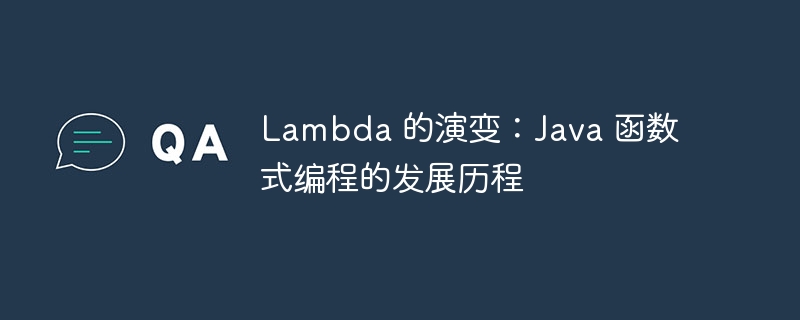Home >Java >javaTutorial >The evolution of Lambda: The evolution of functional programming in Java
The evolution of Lambda: The evolution of functional programming in Java
- WBOYWBOYWBOYWBOYWBOYWBOYWBOYWBOYWBOYWBOYWBOYWBOYWBforward
- 2024-03-23 15:16:511009browse

php editor Xiaoxin takes you to explore "The Evolution of Lambda: The Development History of Java Functional Programming". Since the introduction of Lambda expressions in Java 8, functional programming has gradually become mainstream in Java. This article will trace the evolution of Lambda expressions, explore its impact and application in Java programming, and help readers gain a deeper understanding of the development of Java functional programming.
Introduction of Lambda expression
The syntax of Lambda expression is as follows:
(parameters) -> expression
The parameter list is optional and the expression can be any valid Java expression. Lambda expressions can replace anonymous inner classes, making them easier to create and use.
Functional interface
In order to support Lambda expressions, Java 8 introduced the concept of functional interfaces. A functional interface is an interface with only one abstract method. This allows a Lambda expression to match any method that conforms to this interface.
Lambda’s Advantages
Lambda expressions provide the following advantages:
- Conciseness: Lambda expressions are more concise and easier to read than anonymous inner classes.
- Flexibility: Lambda expressions can be passed as method parameters, stored in variables, or used as return types.
- Enhancement: Lambda expressions enhance Java's functional programming capabilities, allowing developers to write simpler, more maintainable, and more readable code.
The evolution of Lambda
Since Java 8, Lambda expressions have continued to evolve, adding new features and enhancements:
- Method reference: Method reference allows the use of Lambda expressions to reference existing methods, further simplifying the code.
- Streams API: Streams api is a powerful tool introduced in Java 8 that allows declarative operations on data. Lambda expressions are at the heart of the Streaming API and are used to specify how to manipulate and filter data.
- Lambda scope: In Java 8, a Lambda expression can access local variables within its enclosing scope. Java 11 introduces additional checks for valid final state variables to improve code safety. Local type inference:
- Java 10 introduced local type inference, which allows the compiler to infer the parameter and return value types of a lambda expression from its context. Parallelism for Lambda expressions:
- Parallel streams in Java 9 allow Lambda expressions to run in parallel, improving performance.
Lambda expressions are an important milestone in the evolution of functional programming in Java. They enable developers to write cleaner, more efficient, and more maintainable code. As the Java language continues to evolve, we expect lambda expressions to continue to play a key role, providing developers with powerful tools to build complex applications.
The above is the detailed content of The evolution of Lambda: The evolution of functional programming in Java. For more information, please follow other related articles on the PHP Chinese website!

